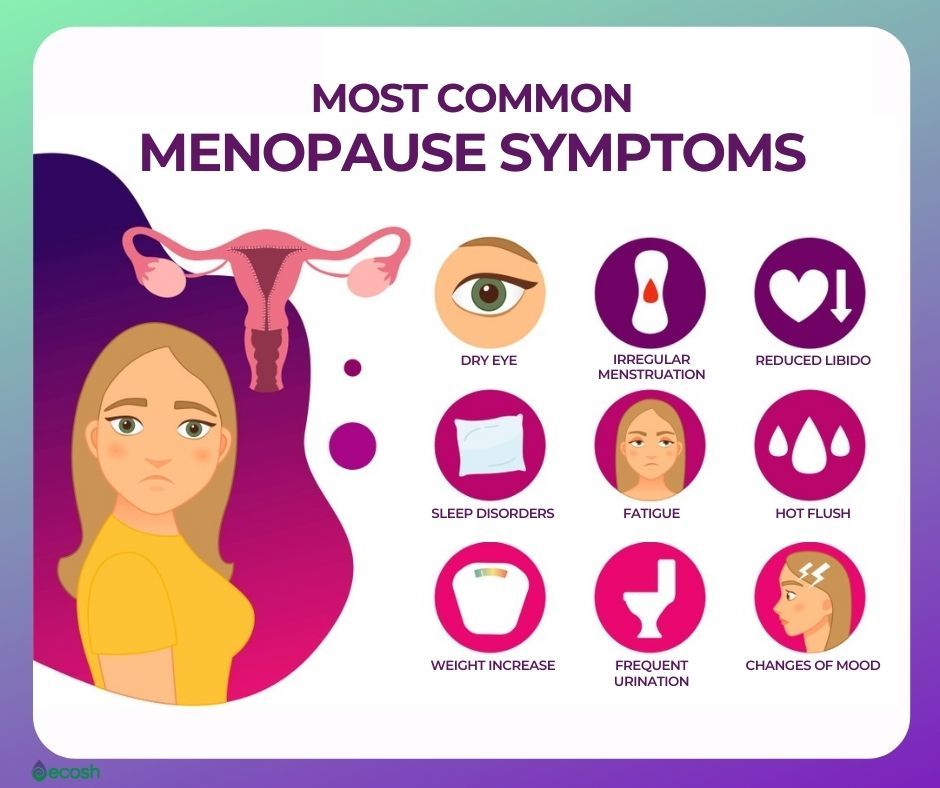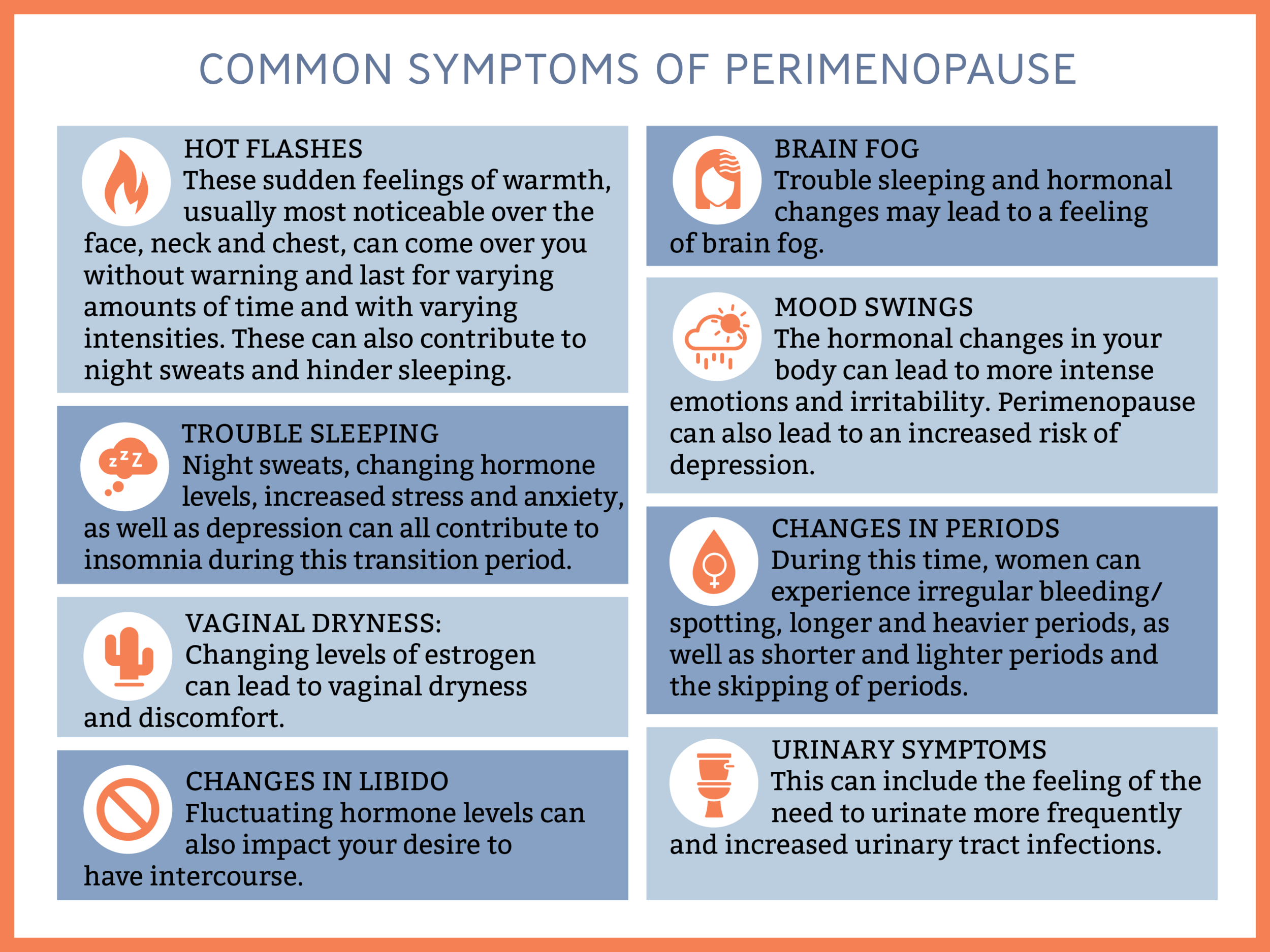Pre menopause symptoms, a topic often shrouded in mystery and discomfort, unveils itself in this comprehensive guide. We delve into the physical, emotional, and lifestyle implications of this transformative stage, empowering women with knowledge and strategies to navigate it with grace and resilience.
As women approach their mid-life, their bodies undergo a gradual yet profound shift, marked by a decline in estrogen and progesterone levels. This hormonal symphony orchestrates a range of pre menopause symptoms, from the infamous hot flashes to subtler changes in mood and sleep patterns.
Pre-Menopause Symptoms

Pre-menopause is a transitional phase that occurs several years before menopause. During this time, the body undergoes hormonal changes that can lead to a range of physical and emotional symptoms.
The most common physical symptoms of pre-menopause include:
- Irregular periods
- Hot flashes
- Night sweats
- Mood swings
- Sleep disturbances
- Weight gain
- Skin changes
- Hair loss
Hormonal Changes
The hormonal changes that occur during pre-menopause are primarily related to the decline in estrogen production. Estrogen is a hormone that plays a key role in regulating the menstrual cycle and maintaining the health of the reproductive system. As estrogen levels decline, the body becomes less able to regulate the menstrual cycle, leading to irregular periods.
The decline in estrogen also affects other bodily functions, such as body temperature regulation, mood, and sleep. This can lead to symptoms such as hot flashes, night sweats, mood swings, and sleep disturbances.
Impact on Daily Life and Well-being
The symptoms of pre-menopause can have a significant impact on daily life and well-being. Irregular periods can make it difficult to plan activities and can lead to embarrassment or anxiety. Hot flashes and night sweats can disrupt sleep and make it difficult to concentrate during the day.
Mood swings and sleep disturbances can also affect relationships and work performance. Weight gain, skin changes, and hair loss can also have a negative impact on self-esteem and body image.
Causes of Pre-Menopause Symptoms
The primary cause of pre-menopause symptoms is the natural decline in estrogen and progesterone levels. These hormones are produced by the ovaries and play a crucial role in regulating the menstrual cycle and maintaining reproductive health.
As women approach menopause, the ovaries gradually produce less estrogen and progesterone. This decline in hormone levels triggers a series of changes in the body, including:
- Irregular menstrual cycles
- Hot flashes and night sweats
- Mood swings
- Sleep disturbances
- Vaginal dryness
Other Contributing Factors, Pre menopause symptoms
While the decline in estrogen and progesterone is the primary cause of pre-menopause symptoms, other factors may also contribute to their severity. These include:
- Lifestyle factors:Smoking, excessive alcohol consumption, and lack of exercise can worsen pre-menopause symptoms.
- Genetics:Some women are more likely to experience severe pre-menopause symptoms due to genetic factors.
- Medical conditions:Certain medical conditions, such as thyroid disorders or diabetes, can exacerbate pre-menopause symptoms.
Management of Pre-Menopause Symptoms
Managing pre-menopause symptoms is essential for maintaining quality of life and well-being during this transitional period. Various strategies can be employed to alleviate these symptoms, including lifestyle modifications, medical treatments, and alternative therapies.
Lifestyle modifications can effectively reduce the severity of hot flashes. These include regular exercise, maintaining a healthy weight, avoiding caffeine and alcohol, and practicing relaxation techniques like yoga or meditation.
Medical Treatments
Medical treatments for hot flashes include hormone therapy, which involves the use of estrogen or progesterone to regulate hormone levels. Non-hormonal medications, such as antidepressants and anticonvulsants, may also be prescribed to alleviate symptoms.
Genitourinary Symptoms
Vaginal dryness and other genitourinary symptoms can be treated with vaginal moisturizers, lubricants, or estrogen creams. Pelvic floor exercises can also strengthen the muscles supporting the pelvic organs, improving urinary incontinence and other symptoms.
Hormone Therapy
Hormone therapy is a common treatment for pre-menopause symptoms, as it replaces the declining levels of estrogen and progesterone. It can effectively reduce hot flashes, vaginal dryness, and other symptoms. However, it is important to discuss the potential risks and benefits with a healthcare professional before starting hormone therapy.
Alternative Therapies
Alternative therapies, such as acupuncture, herbal supplements, and dietary changes, may provide some relief from pre-menopause symptoms. However, it is essential to consult with a healthcare professional before using any alternative therapies to ensure their safety and effectiveness.
Impact on Physical and Mental Health

Pre-menopause symptoms can significantly impact both physical and mental well-being. It is essential to understand these potential effects to address them proactively and maintain overall health during this transition.
Physically, pre-menopause can increase the risk of certain chronic conditions. The decline in estrogen levels can lead to:
- Osteoporosis: Reduced estrogen levels can weaken bones, increasing the risk of osteoporosis and fractures.
- Heart disease: Estrogen has protective effects on the heart. As levels decline, the risk of heart disease increases.
Psychologically, pre-menopause can bring about mood swings, anxiety, and depression. These symptoms can be caused by hormonal fluctuations and the physical changes associated with pre-menopause.
Maintaining Overall Well-being
Maintaining overall well-being during pre-menopause requires a holistic approach. Here are some strategies:
- Regular exercise: Exercise helps improve mood, reduce stress, and maintain bone health.
- Healthy diet: A balanced diet rich in fruits, vegetables, and whole grains provides essential nutrients and supports overall health.
- Adequate sleep: Aim for 7-9 hours of quality sleep each night to reduce fatigue and improve mood.
- Stress management: Engage in stress-reducing activities such as yoga, meditation, or spending time in nature.
- Social support: Connect with family, friends, or support groups to share experiences and seek emotional support.
Transitioning to Menopause: Pre Menopause Symptoms

Menopause, the cessation of menstrual periods, marks the end of a woman’s reproductive years. The transition to menopause, known as pre-menopause, typically begins several years before menopause and is characterized by a gradual decline in ovarian function.
Symptoms of Menopause
The symptoms of menopause vary widely among women and can include:
- Hot flashes
- Night sweats
- Sleep disturbances
- Mood swings
- Vaginal dryness
- Loss of bone density
- Increased risk of heart disease
Timeline of Menopause
The transition to menopause typically takes several years and can be divided into three stages:
- Perimenopause:This stage begins when a woman’s ovaries start to produce less estrogen and progesterone. It can last for several years and is characterized by irregular menstrual periods and the onset of menopausal symptoms.
- Menopause:This stage is defined as the point when a woman has not had a menstrual period for 12 consecutive months. It typically occurs between the ages of 45 and 55.
- Postmenopause:This stage begins after menopause and lasts for the rest of a woman’s life. During this stage, the ovaries no longer produce estrogen or progesterone, and menopausal symptoms typically subside.
Importance of Regular Medical Checkups
Regular medical checkups are essential during the transition to menopause. These checkups allow your doctor to monitor your symptoms, assess your overall health, and recommend treatments to manage your symptoms.
Quick FAQs
What are the most common pre menopause symptoms?
Hot flashes, night sweats, vaginal dryness, mood swings, and sleep disturbances are among the most prevalent pre menopause symptoms.
Can pre menopause symptoms affect my mental health?
Yes, pre menopause symptoms can trigger mood swings, anxiety, and depression due to hormonal fluctuations and the associated physical and emotional changes.
How long do pre menopause symptoms typically last?
The duration of pre menopause symptoms varies, but they generally last for several years, leading up to menopause.
Is there anything I can do to manage pre menopause symptoms?
Lifestyle modifications, such as regular exercise, a balanced diet, and stress-reducing techniques, can help manage pre menopause symptoms. Medical treatments, including hormone therapy, may also be considered.
When should I see a doctor about pre menopause symptoms?
It’s important to consult a healthcare professional if pre menopause symptoms are severe, persistent, or interfere with daily life. They can provide personalized guidance and treatment options.